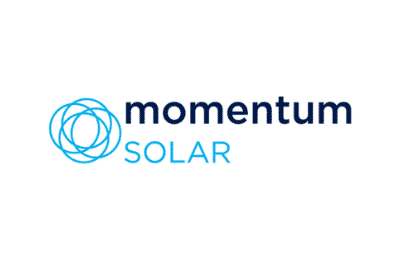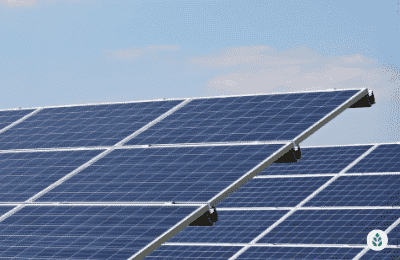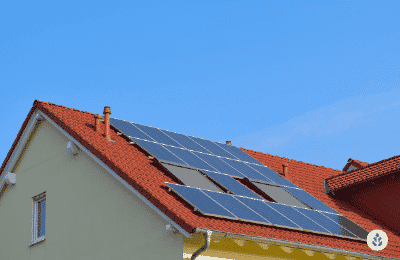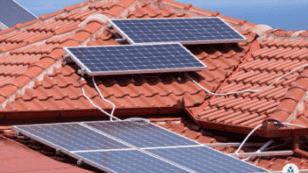
New Jersey Solar Panel Costs (2024 Local Savings Guide)
In this guide to the average cost of solar panels in New Jersey, you’ll learn:
- How much do solar panels cost in New Jersey?
- How can you save money when converting to solar energy in New Jersey?
- Are there any ongoing solar panel maintenance costs to consider in New Jersey?
Each product and or company featured here has been independently selected by the writer. You can learn more about our review methodology here. If you make a purchase using the links included, we may earn commission.
How Much Do Solar Panels Cost in New Jersey?
The average homeowner in New Jersey will pay around $16,513 for a solar panel system after the federal solar investment tax credit (ITC) is considered. Before the credit, you’re looking at an average total of $23,590.
These totals assume that you’ll need the typical 7 kilowatt (kW) system size required in New Jersey to offset your utility bills, which accounts for the state average monthly electricity consumption of 683 kilowatt-hours. This comes out to around an average of $3.37 per watt for your equipment.
Keep in mind that your price can fall well above or below this average, especially if you need a smaller or larger system to offset your energy needs. Most residents pay between $9,436 and $23,590 after the credit.

Blue Raven Solar

Regional Service
Average cost
Pros
- Industry-leading in-house financing
- Competitive pricing
- Excellent reputation
Cons
- Doesn't offer solar batteries (coming 2022)

Momentum Solar

Regional Service
Average cost
Pros
- Great warranty coverage
- Concierge service ensures steady communication
- Representatives are experts on local policies
Cons
- Slightly limited service offerings
- Only available in 11 states

Trinity Solar

Regional Service
Average cost
Pros
- Many financing options
- Family-owned and -operated
- Makes charitable contributions
- Relatively short workmanship warranty
Cons
- Limited service area
The table below includes some more specific pricing information based on the size of the system your home needs.
| Size of Your Solar Panel System | Total Solar Panel Cost Before the Federal Credit | Cost After Federal Tax Credit | Home Size This System is Typically Appropriate For |
| 4 kW | $13,480 | $9,436 | 1,100 sq ft |
| 5 kW | $16,850 | $11,795 | 1,300 sq ft |
| 6 kW | $20,220 | $14,154 | 1,500 sq ft |
| 7 kW | $23,590 | $16,513 | 1,700 sq ft |
| 8 kW | $26,960 | $18,872 | 1,900 sq ft |
| 9 kW | $30,330 | $21,231 | 2,100 sq ft |
| 10 kW | $33,700 | $23,590 | 2,300 sq ft |
While it’s convenient to see solar system costs in New Jersey based on home square footage, this isn’t the metric that professionals will use to size your system. Your monthly electricity consumption is much more crucial to take into consideration, so most will use that number to design your array.
Additionally, California recently adopted net metering 3.0, which significantly decreased the credit rate for overproduced power. In response, most homeowners need to install solar batteries as well to eliminate their electric bills or even to see major reductions and savings over time. New Jersey and other states will likely also adopt this new NEM policy. If that happens, the average cost of solar in New Jersey could jump from around $23,590 before the ITC to $33,590 with one battery or $43,590 with two batteries. Savings over time will also go down.
How Does the Current Cost of Solar in New Jersey Compare to the National Average?
While New Jerseyans pay an average of $16,513 for their solar equipment after the federal credit, the average national cost of going solar sits quite a bit higher at $20,979. Before the credit, that’s an average of $23,590 in New Jersey and $29,970 in the country.
While the all-in price to convert to solar is lower in New Jersey than in most other states, the per-watt price is higher. Photovoltaic (PV) equipment in New Jersey usually costs around $3.37 per watt, around 1% higher than the national average of around $3.33. As such, your money won’t go as far in New Jersey when adopting solar.
The reason the total project cost is lower is that New Jersey homeowners typically use well below the average amount of energy in kilowatt-hours (kWh) per month.1 The average New Jersey household consumes 683 kWh per month, whereas the typical home in the U.S. uses 881 kWh, around 128% of the rate in NJ. That means that although the per-watt price of solar is slightly above average, you don’t need as many solar panels to offset your energy consumption, which yields lower overall prices.
Watch Below: Learn What New Jersey’s TREC Program Is And How They Differ From SRECs
How Are Solar Costs Trending in New Jersey?
In the past ten years, the price of solar equipment has dropped by around 53% in New Jersey, according to the Solar Energy Industries Association (SEIA).2 Solar has never been more affordable than it is right now in the Garden State.
The price of PV equipment in your area will likely continue to drop. Advancements in solar technology and improvements to the manufacturing process are continuously driving down equipment prices, and that trend has shown no signs of slowing in recent history.
At the same time, electricity prices have been on the rise in Jersey. According to the Bureau of Labor Statistics, the electricity rates in New Jersey have increased by around 19.7% in the past four years.
While this trails behind the national average rate increase of 20.8%, it still means energy costs are going up at significant rates. This is not to mention that the base rate for electricity is higher in New Jersey than in most states.3 New Jerseyans pay an average of 18.54 cents per kWh, which is a bit higher than the national average of 16.79 cents.
The increase in energy costs coupled with a falling price of panels makes solar a great option in New Jersey. Not only will converting to clean energy reduce your carbon footprint, but you also stand to save tens of thousands of dollars on your energy bills over the life of your equipment.
How Much Can You Save By Going Solar in New Jersey Today?
The average New Jerseyan will save around $32,398 on energy bills over the lifespan of their panels, and that’s after the panels pay for themselves. This assumes you pay in cash; solar financing will reduce the total savings by around $5,000. Considering the energy burden of sticking with fossil fuels (the cost of doing nothing) in NJ — around $55,988 — solar is a great financial decision for most.
These estimated savings are based on current electricity rates, so you should keep in mind that your actual savings will likely be significantly higher. As mentioned, energy costs are increasing, and converting to solar essentially lets you lock in a much lower rate for 20+ years of panel life.
The three primary solar financing options — cash purchase, solar loan and lease agreements — can affect your savings as well. We’ll provide additional information on the effect your payment option has on your long-term savings in the chart below and in the following sections.
| Solar Financing Option | Initial Cost | Payback Period | Est 25-Year Savings |
| Cash | $16,513 (after the federal credit is considered) | 10 years* | $32,398* |
| Loan | Often $0 — choosing a down payment can decrease your long-term costs, though | 13 years* | $25,000* |
| Lease | Almost always $0 | N/A | $6,000 |
*These are conservative estimates intended to represent base-level averages. In most cases, customers can see an even higher ROI and shorter payback periods.
Cash Purchase of Solar System
When you buy your system in cash, you’re signing up for the shortest payback timeline and the most significant long-term savings. Since you won’t be paying interest on a loan, a cash purchase maximizes the benefits you’ll see from your panels.
All solar tax incentives in New Jersey are available in your area when you buy your system in cash, including the federal credit. This isn’t the case with leases, which don’t let you take the federal incentive.
The primary drawback of using cash to buy your panels is that you’ll have the highest initial outlay of money. Some New Jersey property owners cannot justify or afford to pay $23,590 upfront for their systems — keep in mind that the federal credit gets applied later, so your initial costs will average over $23,000 even if you take the entire credit later.
The cost of buying your panels outright outweighs what you’d pay in energy costs for the first ten years or so after installation. In that time, though, the energy savings are expected to pay for the system, and you’ll have an additional 15+ years of savings after you break even. After the payback period — 10 years in your area, on average — all savings will be a return on your investment. Those savings are expected to add up to $32,398 over your system lifespan in New Jersey.
Below, we’ll summarize the pros and cons of using cash to buy your solar power system in Jersey.
Pros of a Cash Purchase in New Jersey
- Maximizes your long-term energy savings
- Minimizes the total you pay for your PV equipment
- Lets you take all incentives
- Leads to panel ownership
- Shortest payback timeline
- Doesn’t require good credit
Cons of a Cash Purchase in New Jersey
- Highest initial cost of any payment method
- May not be realistic, especially if batteries become necessary with changes to net metering
Solar Loan
Using a loan for solar equipment is the preferred method for many New Jersey residents, especially since financing reduces your initial costs — often down to $0. Loans make solar far more accessible to residents who cannot afford to pay the entire system cost all at once.
As is the case with all loans, you will pay finance charges for your panels in the form of interest. The average solar interest rate in New Jersey is around 7%, but the rate can fall anywhere from 4% up to about 20%. Some lenders also charge an origination fee, which cuts into your long-term savings. You should choose the lowest interest rate possible and avoid origination fees, if you can.
Finance charges drive up the long-term cost of converting to solar, as you’ll pay an average of around $5,000 in interest over the life of your loan in New Jersey. Additionally, loans aren’t available to everyone, as eligibility is based on credit.
If you are eligible and use this payment option, keep in mind that the added interest will prolong your payback timeline. Most customers who choose a loan in New Jersey see savings that pay for their systems within 13 years. This still leaves room for plenty of return on your investment, but the return will be lower overall.
Many financiers and solar installation companies that provide financing for PV equipment can adjust your loan terms so that your monthly payment is equal to or less than what you currently pay for electricity. That means most property owners will have a total monthly payment — loan payment plus utility bill — of $126.63 or less in New Jersey.
Just like cash purchases, solar financing leads to panel ownership and lets you take advantage of all of the benefit programs available in Jersey.
Below are some upsides and downsides of choosing a loan to pay for your solar equipment.
Pros of Solar Loans in New Jersey
- Minimal or no down payment required
- Monthly payments can often be lower than current electric bills
- Lets you take advantage of all New Jersey solar incentives
- Leads to panel ownership
Cons of Solar Loans in New Jersey
- Requires a credit check and decent credit
- Interest leads to higher overall payment for system
Solar Lease
Leases for solar equipment used to be more popular before loan options became readily available and affordable. Lease agreements have you pay a monthly rental fee for your panels, and you get to keep the energy they generate while they’re on your home.
In most cases, the energy your panels produce will offset your electric bills such that your total monthly payment is below what you currently pay for electricity. That means you can support the clean energy movement without an enormous outlay of cash.
Leases do not lead to panel ownership, so there’s no payback timeline to consider. Unfortunately, that means the return on investment you’ll see with a lease will be far lower than with cash or a loan. The average New Jersey solar customer saves around $6,000 on electric bills over the life of their PV panels.
The major benefit to leases is that there is almost never any down payment requirement, so they’re super accessible.
Below, we’ll include a breakdown of the benefits and drawbacks of using a lease to acquire your panels.
Pros of a Solar Lease in New Jersey
- Usually no down payment required
- Let you support renewable energy without much of investment
- Typically reduce what you’re currently paying each month for electricity
- Might be one of the only viable options once NEM 3.0 takes effect
Cons of a Solar Lease in New Jersey
-
- They don’t let you take the federal tax credit and some other incentives
- Don’t lead to panel ownership
- Save you the least on electric bills over time
- Often require a credit check
- Can come with high fees for early cancelation
How Do You Get the Best Solar Prices in New Jersey?
With solar power system prices topping $23,000 before any incentives in Jersey, it’s important to do everything you can to bring down the effective cost of your equipment. There are a few things you can do, including:
- Filing for the federal solar tax credit
- Taking advantage of net metering
- Opting into the Transition Incentive perk
- Opting into the Successor Solar Incentive (SuSI) program
- Getting multiple quotes for equipment
We’ll discuss how these tips can help save you money in the sections below.
File for the Federal Tax Credit
Hands down, the most enticing and helpful benefit program available to New Jerseyans is the federal solar tax credit (ITC). This provides a credit of up to 30% of your entire system cost — including panels, inverters, racking equipment, batteries and labor — to your income tax for the tax year your system is installed and commissioned.
In New Jersey, where the typical system costs $23,590, the credit value averages $7,077. If you can take the entire credit, you’ll effectively bring down your system price by a third. If you can’t, you can push the unused credit to future tax bills for up to five years.
The ITC is a breeze to apply for, so it’s well worth your time and effort. When you’re ready to file your taxes, you just need to include IRS form 5695, which is the form for reporting Residential Energy Credits. You’ll just need basic information about your system and your installer.
You can head over to the IRS’ website for a copy of the form or for more information about the program.4
Take Advantage of Net Metering
Another important incentive that we feel you shouldn’t miss in New Jersey is net metering, also called net energy metering (NEM). NEM is a policy that is mandated in Jersey by the Public Utilities Commission (PUC). All utility companies must offer this program, so it’s important that you make sure you’re eligible.
Basically, the program credits you for all excess energy your panels generate that you don’t use. In New Jersey, all credits via net metering are offered at the full retail rate, which is the best-case situation. Your credits roll over to future bills for up to a year.
For example, if you generate 1,000 kilowatt-hours (kWh) in June but only consume 600 kWh, then you can take up to 400 kWh off of your next bill. This helps you reduce bills at times when energy usage outpaces production, like in the winter or on cloudy days.
You may need to reach out to your electric company to make sure you have a bi-directional meter installed, which is required to take advantage of this perk.
Keep in mind that net metering policies are changing constantly in all states, and New Jersey is no exception. The new NEM 3.0 program piloted by California is eventually going to make its way to other states. If and when it does, the credit rate will dip dramatically. Most homeowners will have to invest in solar batteries alongside panels — an additional $10,000 to $20,000 — to enjoy solar savings.
Right now, the net metering policy in New Jersey is outstanding. If it changes, savings will decrease for new solar customers.
Opt Into the Transition Incentive Program (TRECs)
In an effort to achieve the state’s Renewable Portfolio Standard (RPS) goals, New Jersey also offers Transitional Renewable Energy Credits (TRECs), which are similar to the Solar Renewable Energy Certificates (SRECs) in other states.
Solar customers who opt into the Transition Incentive Program will earn credits for every 1,000 kWh (1 megawatt) they generate with their panels. Each credit is worth around $90 in New Jersey as of the time of writing. The average solar customer in New Jersey can expect to earn about one TREC per year depending on the size of the system.
TRECs help you pay off your solar equipment more quickly, and there’s absolutely no downside to being enrolled in the program. As such, you should make sure you take advantage of this perk. To do so, you can check the guidelines and eligibility requirements on NJ Clear Energy’s website.5
Get Multiple Solar Quotes
Finally, we recommend getting multiple solar estimates for your solar installation. According to the SEIA, there are over 200 solar panel installation companies that can serve you in Jersey.6 Each of these companies charges different prices for equipment and labor, so total system price differences can be in the thousands of dollars.
Although it’s a bit time-consuming to get multiple estimates, most companies offer free quotes, so it won’t cost you anything. Plus, you stand to save quite a lot of money if you find an installer that discounts equipment to keep solar affordable.
Just keep in mind while you’re searching for a provider that it’s important to consider the value provided in addition to the cost estimate. You should look at a few different factors, including:
- The efficiency of the panels offered
- The quality of the brands installed
- The warranty coverage you get with your system
- The reputation the company has for customer service
What Factors Affect the Cost of Solar Panel Systems in New Jersey?
There are several important factors to consider when estimating the cost of your solar system in New Jersey. These include the quality and efficiency of the panels you’re installing, the financing or payment option you pick and the installer you choose, among other things. We’ll explain how these factors come into play in the following sections.
The Solar Equipment You Choose
As with any other equipment purchase for your home, the type of equipment you choose for your solar installation will play a major role in the total tab for your system.
Solar panel brands vary in efficiency, with higher-efficiency options typically costing more. New Jersey homeowners usually don’t need to choose the highest-efficiency brands because the state gets sufficient sunlight on average (206 days per year) to offset energy consumption even with moderate-efficiency panels. Plus, homeowners in the Garden State use less electricity — 683 kWh per month — than residents in most other states — 881 kWh per month — so they can get away with few panels. This is just one reason why overall costs for solar in NJ tend to be lower than average.
Generally speaking, most of New Jersey isn’t prone to much extreme weather, with the exception of nor’easters that can bring heavy snowfall and strong winds.
The risk of power outages is far lower than in states that experience more intense weather conditions, so relatively few NJ homeowners opt for solar batteries. Batteries are add-on products that raise the overall price for your system, so this is another reason why solar equipment costs in NJ are generally quite low. Remember, though, that the expected changes to net metering in the future will make batteries a necessity, which means you might want to consider installing batteries now. If you install panels only now and retrofit batteries, you won’t be able to use the ITC for the batteries as well, so they’ll cost you more.
The Payment Option You Choose
Solar panels are expensive, but most homeowners have options when it comes to financing them.
A cash purchase means you pay the entire cost of the panels up front, but you won’t have interest charges, minimizing your total cost. A loan reduces or eliminates your up-front payment, but you’ll pay interest which will raise the long-term cost of your system.
Solar leases and power purchase agreements (PPAs) are also options for putting no money down, but these tend to cost even more than solar loans. These might end up being the only viable options for many homeowners once New Jersey adopts net metering 3.0 and batteries are required in the state to see solar savings.
Homeowners in NJ have access to plenty of solar payment options. Unfortunately, there is no Property Assessed Clean Energy (PACE) program for residential customers — although a C-PACE program does exist for commercial customers — nor is there any dedicated financing option to make solar more accessible to low-income households.
The Installation Company You Hire
The installer you choose for your solar project can have a significant impact on what you pay for your system as well. Every company charges different rates for labor and equipment, and each company only offers specific panel brands, which can have an effect on the overall price as well.
Below are some of the top solar installers in New Jersey, which we recommend you consider for your solar project:
- SunPower
- Momentum Solar
- Trinity Solar
- Solar Energy World
- Green Power Energy
- New Jersey Solar Power
- Impact Solar, LLC
When you’re comparing the solar installation cost of different installers in NJ, it’s helpful to compare the quality of the brands they offer.
For example, SunPower is one of the best national solar companies that serves NJ, and it installs only panels from its sister company, Maxeon.
These monocrystalline panels are some of the most expensive and efficient in the solar industry. As such, SunPower’s pricing will naturally be higher than that of other companies, especially those that offer lower-efficiency polycrystalline panels. However, you’ll also get higher efficiency, a better warranty and better overall performance.
On the other hand, Green Power Energy and New Jersey Solar Power — two local solar companies in NJ — install brands like SolarEdge, Tesla and JinkoSolar. These panels are more affordable but have a lower efficiency and a less appealing warranty. The cost will be lower, but the value will also be lower.
Are There Any Maintenance Costs of Going Solar in New Jersey?
Some property owners in New Jersey worry about ongoing maintenance costs for solar equipment, especially since the state is prone to some extreme weather, including nor’easters, hurricanes and tropical storms.7 Thankfully, most customers don’t have any recurring maintenance charges for their panels.
Some solar customers get cleaning services once or twice a year, which typically cost between $75 and $150 each time. The goal of the service is to remove dirt and debris that can cause a dip in panel production. Jersey sees more rainfall than most states, and the precipitation should keep your panels plenty clean to maximize efficiency.8
Another typical maintenance request is panel removal and reinstallation before and after roof repair or replacement. This service totals between $500 and $1,000 in most cases, although the price can fluctuate based on the installer you go with.
This isn’t a common maintenance practice in New Jersey, so you likely won’t need to worry about it. Reputable installers will let you know if your roof should be replaced prior to panel installation to avoid this service. Despite the severe weather in Jersey, unexpected roof damage isn’t terribly common, so most customers don’t need removal/replacement.
Typical Costs of Solar Providers In New Jersey
While the average cost to install solar after the tax credit in New Jersey is $16,513, prices between $9,436 and $23,590 aren’t uncommon. One of the more significant cost factors in the area is the company you choose to carry out the installation. In the chart below, you can find relative pricing for what we believe are the best solar installers in New Jersey.
| Solar Installer | Average Installation Cost Per Watt ($-$$$$$) |
| SunPower | $$$$ |
| Momentum Solar | $$$ |
| Trinity Solar | $$$ |
| Solar Energy World | $$$ |
| Green Power Energy | $$$ |
| New Jersey Solar Power | $$$ |
| Impact Solar, LLC | $$ |
FAQs: Solar Panel Cost New Jersey
In the sections below, we’ll include answers to some of the questions we see most frequently about the cost and benefits of going solar in New Jersey.
No, New Jersey doesn’t have any official programs that offer free solar panels. However, solar panels can achieve a payback period of fewer than six years in the state, while lasting for 25 years or more. In other words, you have free electricity for many years after recovering your initial investment.
With a low-interest loan, you can go solar for $0 initially, then use electricity savings to pay off the loan. Strictly speaking, this doesn’t make solar panels free, but they are essentially paying for themselves.
Yes, solar is generally considered worth it in New Jersey. New Jersey has above-average electricity prices, many incentives and rebate programs for solar energy, which improve your return on investment when going solar. Although there are sunnier places in the U.S, New Jersey gets enough sunshine to make solar panels cost-effective.
Plus, incentives like the state’s sales tax exemption, property tax exemption, TRECs and net metering all make solar far more valuable and profitable in the area.
Yes, you sell power back to the grid in NJ. New Jersey has one of the best net metering programs in the U.S., where you get full credit for solar electricity that gets exported to the grid. Unused credit can be rolled over to the next month, and you get paid for accumulated credit once per year.
All electricity sent to the grid is credited at retail price, except for accumulated annual credits, which are paid at wholesale prices (the price paid by electricity providers when purchasing energy from power generators).
The average solar energy system in New Jersey costs around $16,513 after the federal credit or $23,590 before the credit is considered. This price is accurate if you need the average system size for your area — 7 kW — and pay the typical price per watt of $3.37 in Jersey. Your total could be higher or lower than this amount if your size requirements are different or if you choose an equipment brand that is more or less expensive than the average.
Yes! Installing solar panels is expected to boost your home value by around 4.1%.8 In New Jersey, where the average property value is around $495,846, that’s a bump of approximately $20,329.9 Thankfully, the State of New Jersey offers a property tax exemption and waives this value increase when assessing your home. As such, installing solar panels won’t cause your property taxes to increase.
Top Solar Installers in New Jersey Cities
Comparing authorized solar partners
-
- Industry-leading in-house financing
- Competitive pricing
- Excellent reputation
- Doesn't offer solar batteries (coming 2022)
A+Best Solar Financing2014Trina Solar, Canadian Solar, SolarEdge, Silfab, SunPower25-year manufacturer warranty; 10-year workmanship warranty, 2-year production guarantee
Having trouble deciding? Click below and use our process to receive multiple quotes instead:

 233k
233k  41k
41k  Subscribe
Subscribe 








